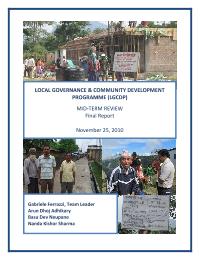
Local Governance and Community Development Programme
Completedon 22 Oct, 2010
Evaluation Plan
Planned End Date
Oct 2010
Evaluation Type
Project
Management Response
Yes
Evaluation Budget
$50,000
Summary
The main conclusions of the Mid-Term Review of the LGCDP were that the LGCDP was a timely response to the post-conflict scene in Nepal, and must be lauded for the way it brought Development Partners together in a programmatic effort in a field that was very fragmented. Evidently the program was very ambitious, and it has not been possible to implement it as designed. It seemed politically important at the time to proceed while the program was still being developed. However, channelling more funds to Local Bodies s without the checks and balances of the anticipated demand side and sufficient supply side capacity
development has left the program in a highly vulnerable position. Project quality is threatened
and fiduciary risk is high.
The LGCDP needs to refocus, shedding some activities while giving more attention to the demand side and reducing fiduciary risk. The full impact of the demand side will not be felt until
past the current end of program date. Ideally, the program will be extended, but it must show fairly soon that it can realize the promise of its bold and unique design.
Evaluation Title
Local Governance and Community Development Programme
Atlas Project Number
00060739
Plan Period
Status
Completed
Type
Project
Plan Date
1 Oct, 2010
Completion Date
22 Oct, 2010
Budget
$50,000
Expenditure
$0
Source of Funding
Joint Financing Agreement (JFA) partners
Management Response
Yes
Quality Assessment
No
Joint Programme
No
Joint Evaluation
Yes
Joint With JFA Partners, UNCDF, UNICEF, UNFPA, UNV, UNIFEM
GEF Evaluation
No
Stakeholders
Ministry of Local Development, all development partners
Countries
Nepal
Comments
Yes
Expand
Atlas Project Number
00060739
Plan Period
Status
Completed
Type
Project
Management Response
Yes
Plan Date
1 Oct, 2010
Quality Assessment
No
Completion Date
22 Oct, 2010
Joint Programme
No
Joint Evaluation
Yes
Joint With JFA Partners, UNCDF, UNICEF, UNFPA, UNV, UNIFEM
Budget
$50,000
GEF Evaluation
No
Expenditure
$0
Stakeholders
Ministry of Local Development, all development partners
Source of Funding
Joint Financing Agreement (JFA) partners
Countries
Nepal
Comments
Yes
Expand
National, regional and local levels of governance expand their capacities to reduce conflict and manage the equitable delivery of public services
1: Democratic Governance


